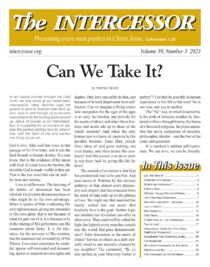
Men Who Learned It–Abraham
Now at last he was prepared for the realized union. God appears to him and says, ‘I am El Shaddai; walk before Me, and be thou perfect.’ And as God is revealed to him as the Almighty One, so his own name is changed to, ‘The father of a great multitude.’ The mind that was formerly bounded by the limited range of its own thoughts can now receive and act on the supernatural thoughts of God. A child of promise is born by an act of faith, which gave him forever the position of ‘the father of all them that believe.’ This was the realized union in the days when the full light that shone from Calvary and Pentecost had not yet given fullness of understanding. The communion of Spirit with spirit is seen in its full and marvelous fruition in Abraham’s life when it was given to him to prefigure the very cross and resurrection. He can receive the word, beyond all natural reasoning, that he is to sacrifice that son of promise, ‘thine only son Isaac, whom thou lovest.’ In doing that he would be sacrificing what God had given him, the very fruit of his faith, the reward of his life of obedience and renunciation. If there had been any [false belief in] independence left in Abraham, it would have appeared now, any secret pride of spiritual achievement, any claim to hold as his own even what he had received from the Spirit; if anyone lived in him but God alone, it would surely be seen now. But no. He was found pure in spirit. God only was the portion of his lot. God must be obeyed. But He also must be believed. He who now said he was to sacrifice his son, had formerly said that in Isaac would his seed be called; therefore he argues that if he must sacrifice him, he must also be raised again from the dead. He did not waver. He traveled the three days to the appointed mount. He left the servants with the ass while he ascended with his son, but he was careful first to say to them, ‘Abide ye here with the ass; and I and the lad will go yonder and worship, and come again unto you,’ for to his eye of faith the resurrection was an accomplished fact. He laid his son on the altar and raised his knife to make the awful sacrifice, and only at that last second did God intervene.
Perfect faith, as James called it, proceeding from a spirit in which the Spirit perfectly dwelt. None but the Spirit, who was to lead a great Son to Calvary and raise Him from the dead, could have given that early father such an insight into the heavenly mind and purpose, such a grace of obedience and such faith; and the Spirit could have given that to no man except to one in whom He could fully think His own thoughts, believe His own believings, and act His own acts.





